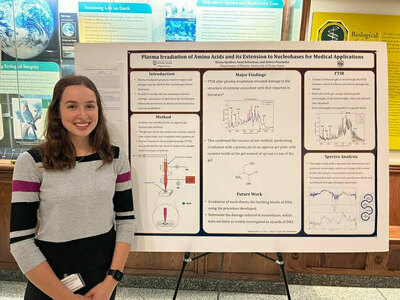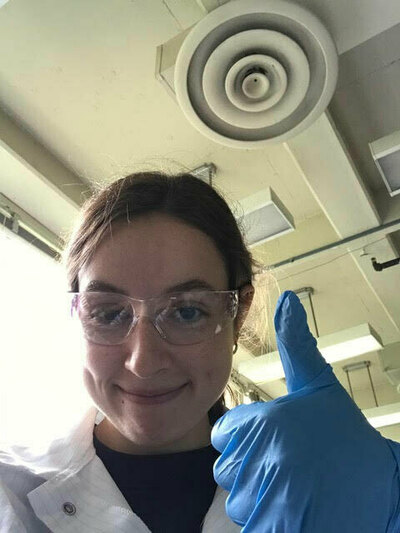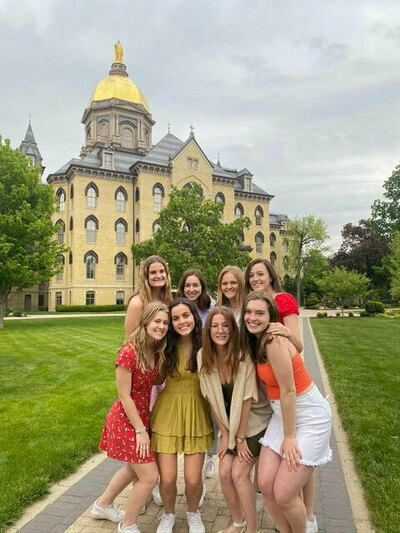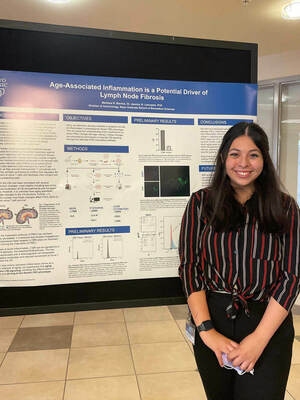
Diana Spulber '23 is a double major in physics and applied and computational mathematics and statistics (ACMS) at Notre Dame. She's a senior with a lot of research experience under her belt and is looking forward to a career in both research and industry.
Here, she discusses the physics major, her favorite classes, and what she loves about being a woman in physics at Notre Dame.
Why did you choose to major in physics at ND?
I absolutely loved my high school physics classes. My teacher, Mr. Johnson’s, passion for physics was contagious. It shone through every lecture he gave us. After a few weeks of class, I discovered the same passion within myself. I left behind my pre-med intentions and decided that I wanted to pursue physics in college.
Were you always interested in topics related to the physics major?
No! As mentioned above, I realized my interest in physics in high school. In addition to classes, I volunteered at a science club at a local elementary school. I remember performing an experiment that taught kids the concept of atoms. One kid asked me, “Woah, so there are atoms in this table?” After that, he could not comprehend how the same atoms were in the window behind him. I realized that he was right. The structure of materials, down to the inside of the atom, is fascinating. This experience was significant in helping me clarify my specific interests in physics.
What has been your favorite class in the program and why?
My favorite traditional class is the one I am taking now, Intro to Solid State Physics. This class dives into the properties of solids, which I can assure you, are a lot more complicated than you would originally expect. I like this class because it combines all of the foundational physics topics I learned in previous classes with my field of interest.
Another class I loved was my circuits class sophomore year. We spent all semester in the lab building a radio. We labored over the soldering of pieces together, but the result was a working radio. It was cool to be able to use our physics knowledge to create a tangible object that was also a great source of entertainment.
What is the hardest/most challenging thing about majoring in physics at ND?
The course load can be challenging at times, but collaborating with classmates is helpful in solving complex problems. We also have office hours with professors and TAs who help us break down the problems. As long as you start the homework early (which I often don’t), it is manageable and extremely rewarding when you solve the problems!

Have you conducted any related research or independent study?
My first year I was a research assistant in the Eskildsen lab. We used simulations to study the structure of magnetic vortices inside of superconductors. Through data analysis, we could visualize how the vortices order themselves with changes in temperature.
Ever since my sophomore year, I have been working with Dr. Sylwia Ptasinska in the Radiation Research Lab, a scary-looking building on library lawn. The main project I worked on involved using a physics-guided neural network to estimate the dose rate of plasma. Knowledge of dose rate is crucial to being able to use plasma radiation in clinical applications such as cancer treatment. This project culminated in a recent publication, which was very exciting.
I also worked on a project irradiating amino acids with plasma to look for structural changes. It was fun to have an experience working in the lab as my previous projects were mostly computational.
Research has been a big part of my experience at Notre Dame and a big factor in my post-graduation plans. I give credit to the physics department for the ease of which I was able to get involved in research. It is very meaningful that my work has contributed to the greater scientific community. Scholarly engagement means applying what you learn in the classroom to a greater good, which is exactly what research enables you to do.
What are you involved in on campus?
Physics-related, I serve as the co-president of the Society of Physics Students, a chapter of the national organization for physics majors. We plan events to build community and provide a space for members to learn more about opportunities in physics and beyond.
I am also a member of the Women in Physics club, where I have been able to meet other women in physics and have supportive conversations while also doing fun things. As a woman in STEM, I think organizations that bring women together are crucial to allowing us to thrive and overcome the extra challenges that we face in the field.
My biggest involvement on campus right now is being an RA in Farley Hall. I absolutely love serving the dorm community and being able to help my residents with whatever they may be going through. Planning events for my section is one of my favorite parts of this role.
I also serve as an International Peer Mentor, providing guidance for exchange students that come to ND for a semester or a year. After studying abroad in Chile last year, this club has become even more important to me as I learned about the highs (and lows) of a study abroad experience.
Throughout these roles I have been able to connect with so many incredible people!
Can you share your favorite Notre Dame memory so far?
It’s hard to pick just one, but one of my earliest favorite memories was the snowball fight my first year. Notre Dame has a tradition where on the night of the first snowfall every year, everyone gathers on South Quad for a giant snowball fight. It was wonderful to see how many people there were running around, pelting each other with snowballs. There was even a lightsaber fight, just as you would expect. On the way back my friends and I stopped to take a picture in front of the Dome. The picture was blurry because it was still snowing and our hands were frozen, but it was also an exhilarating experience.
What’s on your ND bucket list of things to do before you graduate?
In my time left at ND, I want to:
- Be on a boat-building team for the Fisher Regatta
- Support the Baraka + Bengal Bouts tournaments
- Attend Easter Mass at the Basilica
- Cheer on the hockey team at a game
- Walk up the steps of the Main Building (aka graduate!!)
What makes the physics program at Notre Dame stand out?
After coming to Notre Dame for an admitted students’ visit day, I realized that its Department of Physics and Astronomy was a place where I could thrive. I like the cohort size of about 40 students per grade as I have gotten to know everyone. It is wonderful to be able to have this supportive community in the larger community that is the Notre Dame student body. This also makes for the perfect class size in which I feel comfortable speaking.
I was given the opportunity to purse research as early as my first year. The professors are all extremely welcoming and are open to offer mentorship throughout my physics journey.
As a woman in physics, I truly feel support from the department. My voice is always heard and I never feel as if my opinion matters less. The Women in Physics club is a place where female physics majors can gather to share their experiences and provide support to one another. There are still way too few women in the department, but I hope that if we continue to cultivate a supportive environment, more women will be encouraged to pursue physics.

Do you have any advice for prospective students who are considering a major in physics?
If you have even the slightest interest in physics, pursue it! Learning physics means learning about how fascinating the universe is. The more you get into, the cooler classes you get to take, and the greater interest you will gain in the subject. It is also wonderful to be able to sit and talk about these insane theories with your classmates, imagining an alternate universe where some fundamental physical law is different.
On a more practical level, a degree in physics is a great one to have. The skills you learn through physics are translatable to any career. Critical thinking, the ability to work with data, and problem solving are sought-after skills in any field. A major in physics is both intellectually stimulating and rewarding.
What are your career plans/post-graduation plans?
I believe research is foundational to solving problems in society, so I am currently applying for Ph.D. programs to continue my research background. In graduate school, I plan to investigate quantum materials for energy applications. After a brief five-and-a-half years, I plan to go into industry as a research scientist to continue developing new energy-efficient materials and technologies.
Anything else you’d like to add:
Notre Dame is a place like no other. The ND community supports you throughout whatever you want to pursue. Looking forward to graduation next semester, I have gotten nostalgic about everything ND has given me, and about all the memories I have made here. I truly believe Notre Dame is a special place that truly does act as a force for good in the world and in its students. Live, laugh, love, ND.

Learn More
- Explore the physics major at Notre Dame.
- Learn about the College of Science.
- Check out our Stories & News feed to meet other students from different majors.